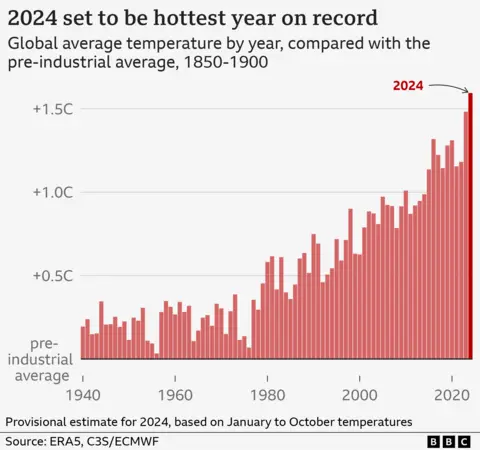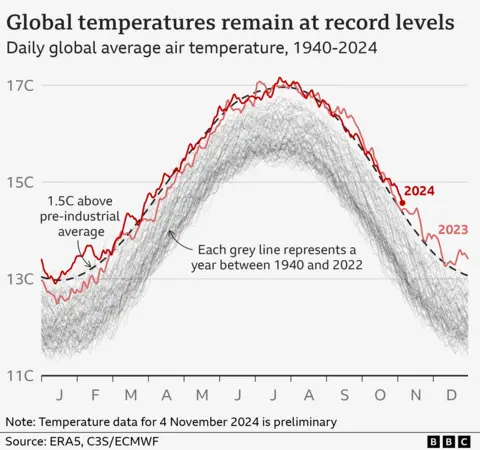 U.S. Environmental Protection Agency
U.S. Environmental Protection AgencyIt is now “almost certain” that 2024 will be the warmest year on record globally, with intense heatwaves and deadly storms, according to forecasts from the European climate service.
The global average annual temperature will eventually be more than 1.5 degrees Celsius above pre-industrial levels, making 2024 the first calendar year to surpass this symbolic mark.
These high temperatures are caused primarily by human-caused climate change, with less influence from natural factors such as the El Niño weather pattern.
Scientists say this should be a wake-up call for next week’s United Nations Climate Change Conference (COP29) in Azerbaijan.
Liz Bentley, chief executive of the Royal Meteorological Society, said: “This latest record sends yet another stark warning to governments at COP29 about the urgent need for action to limit further warming.”
Global temperatures have been so high through the first 10 months of 2024 that only an incredibly sharp drop in the final two months will prevent new records from being set.
In fact, by 2024, temperatures are likely to be at least 1.55 degrees Celsius higher than in pre-industrial times, according to the European Copernicus Climate Change Service.
“Pre-industrial” refers to the base period from 1850 to 1900, which roughly corresponds to the time before humans began to significantly heat the earth, including by burning large amounts of fossil fuels.
The forecast means that by 2024 there could be more than The current record is 1.48C, which was set just last year.
“This marks a new milestone in global temperature records,” said Copernicus deputy director Samantha Burgess.

According to Copernicus data, this also represents the first time in history that the temperature rise has exceeded 1.5 degrees Celsius.
This would be symbolic because Nearly 200 countries pledge to work to limit long-term temperature rise to levels set out in the 2015 Paris climate agreement, hoping to avoid some of the worst impacts of climate change.
If the 1.5 degree Celsius limit is exceeded, it does not mean that the Paris target is broken, as it refers to average temperatures over about 20 years to account for natural variations.
But in the long term, every year of breakthroughs brings the world closer to exceeding the 1.5C mark. Last month, the United Nations warned Under current policies, world warming could exceed 3 degrees Celsius this century.
The specifics of 2024 are also worrying.
In early 2024, temperatures rise El Niño natural weather pattern. Surface waters in the eastern tropical Pacific here are warmer than normal, releasing extra heat into the atmosphere.
The most recent El Niño began in mid-2023, End around April 2024but the temperature has remained high since then.
Over the past week, global average temperatures have set new records for the time of year every day, according to Copernicus.

Many scientists expect the opposite, cooler phase – La Niña – to occur soon. In theory, this should lead to a temporary drop in global temperatures next year, although the exact outcome is uncertain.
“We will be watching with interest what happens in 2025 and beyond,” said Ed Hawkins, professor of climate science at the University of Reading.
But with greenhouse gas levels in the atmosphere still rising rapidly, scientists warn it may only be a matter of time before a new record is reached.
“The temperature is getting warmer [are making] Storms are more intense, heatwaves are hotter and rainstorms are more extreme, with clear consequences for people around the world,” Professor Hawkins said.
“Stabilizing global temperatures by achieving net-zero emissions is the only way to stop increasing the costs of these disasters.”


